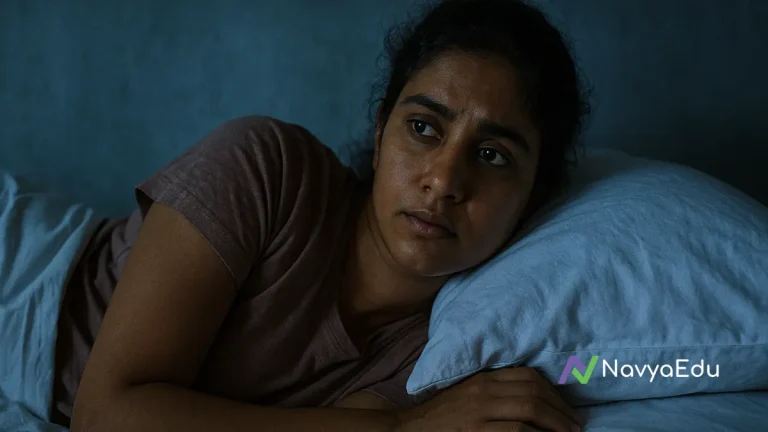As your mentor at NavyaEdu, I’m here to guide you step-by-step through the NEET Counselling 2025 process. Whether you’re an Indian student or coming from abroad, this guide covers seat allotment, required documents, fee structure, and strategies to help you secure your dream college. Let’s make this journey straightforward, friendly, and deeply trustworthy. No confusion, and no missed steps.
Introduction – Why This Guide Matters
Every year, lakhs of students sit for NEET UG, striving for MBBS, BDS, and allied health courses. Once the results are out (NEET result declared on 14 June 2025), comes the most critical step: counselling.
Your counselling choices determine whether you’ll join a government college, private institution, or even a central university like AIIMS, BHU, AMU, or JIPMER.
Missing dates or info can cost your seat—even a seat that’s just within reach!
This guide gives you a clear roadmap: seat allotment rounds, documents checklist, uploading, verification, reporting, and tips to convert rank to admission.
What is NEET Counselling?
Definition & Importance
NEET Counselling is the online process managed by the Medical Counselling Committee (MCC) under DGHS, Ministry of Health & Family Welfare. It controls:
- 15% All India Quota (AIQ) seats in government medical colleges
- 100% seats in central universities, deemed universities, AIIMS, JIPMER, ESIC, AFMC
State authorities run 85% state quota counselling separately.
Why it matters:
A good NEET rank alone isn’t enough. Proper choice filling, document readiness, and strategic reporting ensure you don’t miss seats that might slip away due to avoidable mistakes.
Overview of Counselling Rounds
Typically, 4–5 rounds are held:
| Round | Description |
|---|---|
| Round 1 & 2 | Regular MCC rounds for AIQ and central/deemed seats |
| Mop-Up Round | For vacant seats after Round 2 |
| Stray Vacancy | Final opportunity to fill last-minute vacant seats |
Timeline
- NEET UG Result: 14 June 2025
- MCC Round 1 Registration: Late July to Early August 2025
- Choice Filling & Seat Allotment: Late July / Early August
- Reporting Period: As per MCC notification
- Subsequent Rounds: August to October 2025
Stay alert—dates are tentative, based on official updates from mcc.nic.in and credible sources.
How Seat Allotment Works
The Allocation Algorithm
NEET Rank (AIR)
Categories & Reservation (General, OBC, SC, ST, EWS, PwD)
Choices Filled & Locked
Seat Availability in Colleges
Allotment by MCC
Result Announcement (Provisional → Final)
Upgradation
- If you’re not satisfied with your Round 1 seat, you can opt for upgradation in Round 2.
- If upgraded, the new seat replaces the old one; if not, you stay with your previous allotment—with no extra fee loss.
Important: No upgradation allowed in Final Stray Vacancy Round .
Documents Required – MCC (AIQ/Central)
Based on MCC and Economic Times sources, here’s a detailed checklist:
- NEET 2025 Admit Card & Scorecard
- Class 10 Certificate/Marksheet (DOB proof)
- Class 12 Certificate/Marksheet (qualifying exam)
- Passport-size photos (8 copies)
- Identity proof (Aadhaar/PAN/Passport/Voter ID/Driving License)
- Provisional Allotment Letter
- Category Certificate (SC/ST/OBC/EWS) if applicable
- PwD Certificate if applicable
- For NRI/OCI (Deemed Universities): Passport, embassy certificate, sponsorship affidavit.
Carry both originals and self-attested photocopies.
Documents Required – State Quota
Each state sets its own rules. For example, Uttar Pradesh lists similar documents plus domicile proof and income certificate, with allotment and reporting in early October.
Fee Structure – MCC
Two parts:
- Non-Refundable Registration Fee
- UR/General AIQ: ₹1,000 | SC/ST/OBC/PwD AIQ: ₹500
- Deemed Universities (all categories): ₹5,000
- Refundable Security Deposit
- AIQ/UR: ₹10,000 | Reserved: ₹5,000
- Deemed Universities: ₹200,000 flat
🔔 Tip: Refund is processed only if you do not take admission in any round.
Step-by-Step Counselling Guide
Step 1 – Registration & Fee Payment
Visit mcc.nic.in → UG Medical Counselling
Register with NEET details, fill in personal info correctly
Pay fee via credit/debit/net banking
Step 2 – Choice Filling & Locking
Select courses & colleges wisely based on rank
Save and lock choices before deadline
Use mock tools (Careers360, Shiksha) to help prioritize
Step 3 – Seat Allotment Result
Results posted as PDFs (Provisional → Final)
Check on mcc.nic.in
Step 4 – Acceptance & Reporting
Download Provisional Allotment Letter
Upload scanned copies on MCC portal (online)
Report in person to allotted college with originals
Pay admission fees per college norms
Step 5 – Upgradation Options
Opt-in during next round
If upgraded, follow allotment + reporting again
Step 6 – Mop-Up & Stray Vacancy Rounds
Mop-Up follows Round 2 for vacant seats
Stray Vacancy is final; choices are final—no upgrade
Tips & Real-World Examples
Always lock choices.
Example: Vipul locked choices before the deadline and got his regular MBBS seat. Another student forgot and missed the entire allotment!
Fill all categories for UP/MP states.
If you’re an aspiring seat-taker from Kanpur, don’t forget domicile proof—essential for 85% state quota.
Pay refundable fees judiciously.
AR of Chennai paid ₹200,000 for a Deemed seat but got ₹195,000 back after withdrawing.
Track deadlines daily.
Notifications may come via email or MCC SMS. Keep your phone alerts ON!
India vs Other Countries – Admissions Comparison
India: Centralized via NEET, regulated by NMC (formerly MCI)
UK/US: Entry based on A-levels/12th + interviews/tests + higher costs
Philippines/Ukraine: Direct admission for NEET qualifiers but less regulated environment
Pros (India): Merit-based, reservation, subsidized fees
Cons: High competition, strict timelines
State Quota Coordination
85% State Quota: Managed by respective State Medical Councils, often requiring fresh registration
Example: UPNEET seat allotment scheduled 3–5 Oct, reporting till 4 Oct
Always check your home state’s portal (like upneet.gov.in)
Pros & Cons
Pros:
- Merit and category transparency
- Multiple rounds (upgradation chances)
- Reserved seats ensure fair access
- Refundable deposits ease financial burden if no admission
Cons:
- Tight deadlines, harsh cancellation rules
- Different processes for AIQ, state, private seats
- Large refundable amount for Deemed institutions
FAQ
- When does MCC Round 1 start?
Tentatively late July/early August 2025, after NEET result on 14 June - Is seat allotment online only?
Yes, via MCC portal. Physical reporting required only for verification afterward. - Can I keep Round 1 seat and try Round 2?
Yes! Seat is yours until upgraded. You only lose it if you withdraw. - What if I miss the deadline?
Missed deadlines often mean waiting for Mop-Up or Stray Vacancy rounds—no skipping. - Will I get deposit back if no seat is allotted?
Yes, the full refundable amount gets credited. - Are NRI seats different?
Yes; they need additional documents like sponsorship affidavits. No domicile needed.
Conclusion
Completing the NEET Counselling 2025 process can be smooth and reassuring with the right checklist, strategy, and mindset. It’s not just about your score—it’s about being smart with choices, documents, and deadlines. If you found this guide helpful, comment below with your concerns or suggestions, and check out our related posts.
📌 Your next step: Bookmark this post, follow MCC dates closely, and reach out—your dream medical journey starts right here. Good luck!




